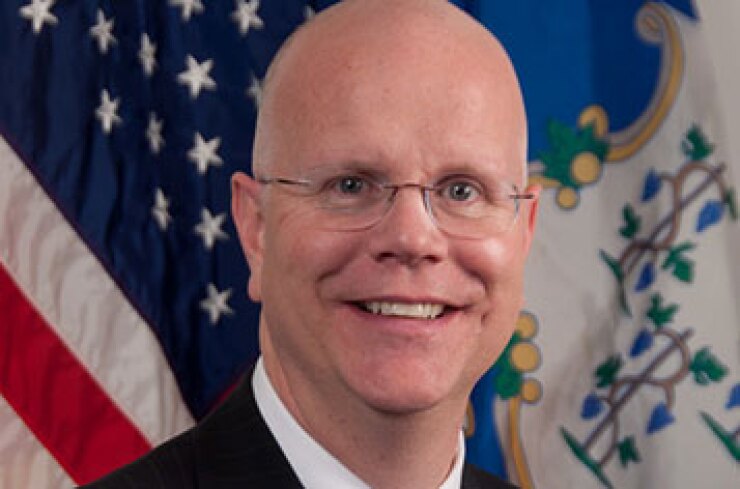
Admitting its budget imbalance problem is Connecticut's first step to reversing bond rating downgrades, said state Comptroller Kevin Lembo.
"We need acknowledge what the situation is. We need to even build a history around how we got there." Lembo said in an interview Friday after his keynote speech at a Municipal Analysts Group of New York luncheon at the Yale Club in midtown Manhattan.
"Then after that, you need to lay out a plan to either stop a behavior that's causing uncertainty or do the things necessary to satisfy the obligations of the state in a way that fulfills our obligations but also gives some comfort to those who are deeply concerned with what we're doing."
Siebert Cisneros Shank & Co. expects to price the state's $964 million sale of special tax obligation bonds and special tax obligation refunding bonds for transportation infrastructure purposes on Tuesday, after a one-day retail order period.
Fitch Ratings on Sept. 2 lowered its rating the tax obligation bonds one notch, to AA-minus from AA. Moody's Investors Service and S&P Global Ratings assign Aa3 and AA ratings, respectively.
Connecticut has received three general obligation downgrades within four months. Rating agencies cited the state's dwindling reserves. In May, S&P and Fitch both lowered the state to AA-minus while Kroll Bond Rating agency did likewise in July. Moody's assigns an equivalent Aa3 rating.
State officials project having to withdraw $316 million from the budget reserve, or rainy-day fund, to balance its biennial budget. That would leave Connecticut with $90 million in that account, or 0.5% of its fiscal 2016 general fund expenditures, with no plans to replenish it.
The biggest source of revenue volatility is in quarterly income tax filings, said Lembo. Many workers' earnings interweave with Wall Street and their tax payments are subject to the ebbs and flows of the stock market.
Still, Connecticut government has allowed itself to fall into a trap the past few decades, he added.
"When the economy surges and state revenue rises with it, new, sometimes costly programs are created, and in Connecticut, our 169 towns compete for bond funding, lining up to get gazebos and band shells, and they often get handed out in good economic times, like candy at trick-or-treat time."
Lembo's office plans another revenue update on Sept. 30. Earlier this month, he said early results are consistent with the fiscal 2017 budget plan.
"Kevin Lembo's our most honest comptroller in a long time and even he says our budget may not be in balance," said State Sen. Scott Frantz, R-Greenwich. "We have a shortage of revenue and our forecasts have been way too rosy for the past few years.
"Unless we make serious internal structural changes, we have a chance to be the next Puerto Rico," Frantz said.
A state judge's ruling last week could also cloud Connecticut's budget picture. Superior Court Judge Thomas Moukawsher ruled that the state's funding mechanism for public schools is unconstitutional because of funding discrepancies between affluent and poor school districts. Moukawsher ordered the state to craft a new funding formula. Attorney General George Jepsen is reviewing the decision.
Connecticut's loss of Fortune 500 behemoth General Electric, which is relocating its headquarters from Fairfield, Conn., to Boston, has fueled debate over the state's business climate. In addition, GE chose Providence, the capital of neighboring Rhode Island, to locate 100 new technology-related jobs.
"Providence could easily have been New Haven," said Lembo. "The fact that those 100 new jobs for new young, smart people went to Providence makes my head almost hurt more than the loss of 200 jobs in Fairfield. We've got a lot of tech, too, and we could have done that, but I don't think GE wants to deal with us right now.
"How do we grow the next environment? I think we're doing that, but it needs to be much more energetic."





